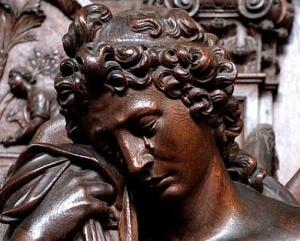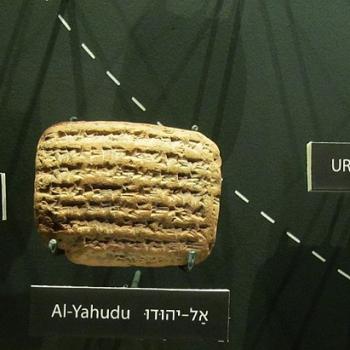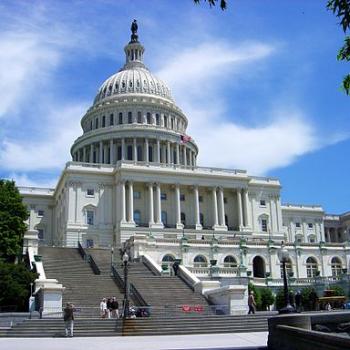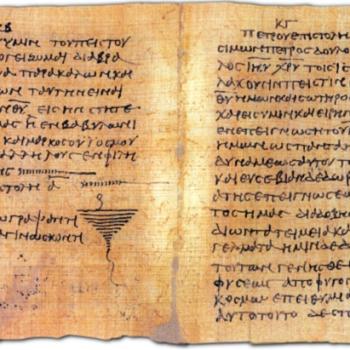Gender identity was seen much differently by the Jews of Jesus’ day than the issue is seen today. Gender was wrapped up entirely in biological realities. True, they did not know about DNA. They did not know that if you alter the sexual organs with which a person is equipped, every remaining cell in their body will continue to shout the gender with which they were born, but if they had known this, they would have added DNA into their rigid compartmentalized system of gender identity.

The only hint of psychological gender identity on the ancient Jewish radar screen was the Biblical command, “A woman shall not wear the apparel of a man, nor shall a man wear the garment of a woman, for that is an abomination/obscenity in the eyes of YHWH” (Deuteronomy 22:5). True, what constitutes feminine or masculine apparel is ultimately defined by culture, but it is the will of the mind to identify completely with the wrong gender which is described as reprehensible to God (along with fraudulent weights and measures, idolatry, burning one’s children in sacrifice, witchcraft, the wages of a female or male prostitute, and officials who justify the wicked or condemn the righteous).
In their rules, the rabbis of Jesus’ day had gender categories for male, female, those of “doubtful sex,” and those of “double sex” (androgynos, someone with both kinds of sexual organs). By the time of the Talmud, six genders have been identified (see http://www.sojourngsd.org/blog/sixgenders), but I will confine this overview of rabbinic traditions on gender to the Mishnah (approximately 200 AD), the core of teachings from which the Talmud was composed in later centuries.
Those of “double sex” were treated like men in that they could marry women, but could not marry men, and were not entitled to support when they reached adulthood (Bikkurim 4:2). They were treated like women in that they could not inherit property unless they had no brothers, their testimony was not normally allowed in court, they were not allowed to eat sacrifices that were reserved for men, and they were not obligated to attend the three Jewish festivals (Bikkurim 4:3). They were not allowed to remain alone with either a man or a woman (Bikkurim 4:2-3). They could contaminate others due to discharges common to either gender, but they themselves did not become officially unclean (Zabim 2:1), because they did not count as a member of either gender. Among animals that could not be sacrificed because of blemish, one rabbi said “no blemish is greater than” the beast of double sex (Bekhoroth 6:12).
Although those of doubtful sex had legal rights as victims of crimes such as murder, robbery, or injustice (Bikkurim 4:4), there were some areas where they counted as neither male nor female. When vowing a person to God, monetary valuations were assigned to men and to women (on a sliding scale by age – see Leviticus 27), but no monetary value could be assigned to those of doubtful sex (Arakhin 1:1). Likewise, if a man promises to pay X amount of money if his wife bears a son, and X amount for a daughter, if she bears a child of doubtful sex, the man pays nothing (Baba Bathra 9:2). It was also debated whether one could profane the Sabbath to save the life of a child of doubtful gender (Shabbath 19:3).
The rabbis recognized eunuchs as males, whether congenital or man-made. A man was reckoned as a congenital eunuch if he had not grown two pubic hairs by age 20 (according to Hillel, age 18 according to Shammai – see Niddah 5:9). A priest who was a congenital eunuch gives his wife the right to eat the holy food (Yebamoth 8:6), so his marriage was considered valid. Even if a priest has suffered the injury or loss of his genitals, he is still allowed to eat the holy offerings (Yebamoth 8:1-2); he simply is not allowed to enter “the Assembly” (it is unclear whether this means only the Temple, or may also apply to the local synagogue). For more on the Bible’s approach to eunuchs, watch for an upcoming post here.
So, what would Jesus say or do with regard to the issue of gender identity? The burden of proof is entirely on those who would claim that Jesus’ opinion would be any different than the Judaism of his day. His views would be based entirely on biological reality. Inspired by Deuteronomy 22:5, Jesus’ heart would break for those whose hearts reject the gender with which they were created, whose DNA unanimously continues to proclaim the gender of their birth, no matter what surgery may be performed on them. I suspect that Jesus would also be angry at those who would legally or economically bully us into allowing our privacy to be violated by those who claim a gender other than the one they were born with.
But ultimately, I believe the Bible’s message that because Jesus was God in the flesh who died to save all who will turn to him in faith, Jesus loves all those who are in conflict with their gender and with their sexual desires. We live in a broken world, and Jesus lived, died, and rose again, not to affirm our brokenness, but to redeem us from it.












